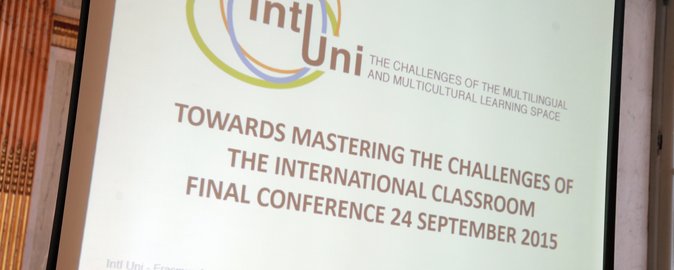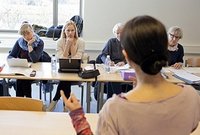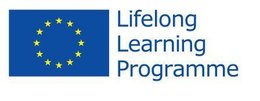The IntlUni project: in our end is our beginning
The three-year IntlUni project has now completed its work, but for many project partners, it has become the beginning of a dialogue within their institutions about the internationalisation of education that will continue long into the future.
2015.10.06 |

The Final Conference of the IntlUni Erasmus Academic Network was held in Brussels on 24 September 2015. Higher Education institutions and the European associations were represented among the speakers, panelists and participants.

Networking opportunity among the project partners and invited guests at the IntlUni Final Conference.

IntlUni work package leader Don Peckham presents some of the findings from the IntlUni Impact and Exploitation report

The IntlUni final conference - Salle des Moroirs, Brussels Parliament

Impact in the classroom

New ideas and approaches
Part of the projects activities included an Impact and Exploitation study, which was conducted by the IntlUni work package leaders Don Peckham, Janina Cünnen and Andreas Kolb in cooperation with the management team in Aarhus. They observed that the project had been an influence in several areas: the practice of teachers in Higher Education (HE), at a senior level in discussions on strategic directions, and as a key collective voice contributing to the evolution of existing initiatives.
Impact on teachers:
The power of uniting 38 project partners from 27 countries cannot be underestimated, and one of the key impact findings was in the raising of personal awareness and knowledge of others’ challenges and solutions in internationalising education. This caused us all to reflect upon our own teaching and our working lives:
“IntlUni has been an opportunity to re-evaluate my practice and to compare my work and experiences in the international university with others in similar and dissimilar environments around Europe.”- partner A
Similarly, we have made new contacts and met new approaches which we can all take forward to enhance our teaching:
“People collaborating with IntlUni are open to discussions and eager to share information about the specific challenges they are confronted with in the teaching-learning process. Due to awareness raising and networking I have learned what is going on at partner universities. I have also established new contacts with partner representatives.” – partner B
Impact in the classroom:
Several project partners reported the adoption of new ideas and approaches in their own classrooms:
“Yes, we are more attentive to didactic, linguistic and cultural differences, to making [the] university learning space more inclusive, to challenges and how other (more experienced) institutions deal with them.” – partner C
“In my own teaching practice I have implemented some of the practices that were collected as examples of good practice from IntlUni partner universities.” – partner D
“First, I started to communicate academic requirements, course policy and standards more explicitly. Second, now I treat international students as a resource in my class and specifically refer to their perspectives and experiences. Third, I have added more international dimensions to my curriculum and teaching content as well as the learning outcomes.”
Impact on the HE institution
Perhaps inevitably, impact and change on an institutional level are more difficult to effect. However, many of our project partners report that they have been able to use their participation in the project to move the discussion on internationalisation forward. In some cases, this involved IntlUni work feeding into existing work:
“IntlUni feeds into internationalization activities and change-discussions which have been ongoing [here] for some time. There is no direct link between IntlUni and change here, but the project will become part of the landscape of influence and discussion which forms the background to change in this area.” – partner E
Others in the project network were able to take more practical steps:
“On university level, I have established a network of teachers and administration involved in courses and programmes in a foreign language. In my institution I have expanded my network of collaboration on matters of internationalization.” – partner F
Many partners within the network acknowledged the difficulty of achieving change:
“…most faculties are autonomous and implementing policy across the board is not easy.” – partner G
However, even where it was accepted that change was an up-hill task, others within the IntlUni group were hopeful that the project’s principles and recommendations would assist the process towards internationalisation of the classroom:
“This is a large university and it takes time for awareness to spread. It remains a fragmentary process that we are seeking to influence through both top down and bottom up processes. The IntlUni principles are a reference point for the university, and a potential reference point for our faculty.” – partner H
The conclusions, which we can draw from the IntlUni Impact and Exploitation study, were:
- The project had been successful in raising awareness about issues around internationalisation with a range of stakeholders. This awareness-raising can create agents for change, and has created at least 38 powerful agents of change across the network.
- Understanding, recording and sharing effective local practice can be a key tool for development across a range of contexts.
- Senior-level administration plays an important role in enabling new initiatives to happen and so it is valuable to maintain pressure and discussion at this level.
- There is already a great deal of work in the area of internationalisation going on across Europe, in partner institutions. This work and information should be shared.
- Much of the impact of the IntlUni project will take place after the end of the project, as we see the Final Report’s recommendations being taken away, absorbed and acted upon in diverse ways across and beyond the network.
Read the full Impact and Exploitation Report here
Contact for further information:
Mrs. Karen M. Lauridsen
Associate professor / IntlUni Coordinator (Erasmus Academic Network 2012-2015)
Centre for Teaching and Learning, Aarhus BSS, Aarhus University
Fuglesangs alle 4, Building 2621-B114, 8210 Aarhus V, Denmark.
Tel.: +45 8716 5105
Mobile: + 45 2443 8938
Mail: kml@au.dk
Ms. Mette Kastberg Lillemose
IntlUni Project Manager (Erasmus Academic Network 2012-2015)
Centre for Teaching and Learning, Aarhus BSS, Aarhus University
Fuglesangs alle 4, Building 2621-B128a, 8210 Aarhus V, Denmark.
Tel.: 8716 4738
Mail: mkl@au.dk

